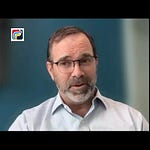The humanitarian sector is hemorrhaging talent. We know it, you know it, and frankly, we can't afford to pretend otherwise.
Good people are leaving for tech companies, consulting firms, and startups, not because they've abandoned their values, but because they need sustainable careers that don't require choosing between impact and financial stability.
But here's what most career transition advice gets wrong: it treats your humanitarian background like a liability to overcome rather than a strategic advantage to leverage. Matt Petit, a 16-year State Department veteran who successfully pivoted to tech, proves this assumption dead wrong.
His story is inspiring, and a roadmap. He is one of many talented colleagues moving into the private sector. It's time we understood exactly how they're doing it.
Family Reality Check
Matt's transition began with family considerations, but it quickly became clear that blind applications through LinkedIn and Indeed were "getting zero, zero, zero response." Sound familiar?
Most of us make this same mistake. We craft the perfect resume, polish our LinkedIn profiles, and fire off applications into the digital void. Then we wonder why companies don't see our value.
The problem isn't your qualifications. The problem is thinking your humanitarian experience needs translation when it actually needs elevation.
Vision Board Exercise
Before Matt applied to a single job, he did something most career changers skip: he figured out who he was and what he absolutely would not compromise on. Working with a career coach, he created a vision board that included pros, cons, and non-negotiables.
"I had and still have a very strong sense of my values," Matt explained.
For humanitarian professionals, this step is crucial. Your values are your competitive advantage. Companies desperately need people who understand mission-driven work, stakeholder management, and operating in complex environments.
First, you need to identify which companies actually live these values.
Beyond LinkedIn's Algorithm
Matt discovered something most job seekers miss: better platforms than LinkedIn exist.
He specifically mentioned Wellfound and Simplify as having superior algorithms for matching values with company culture. These platforms offered screening tools that asked "What do you value most in a company?" and served targeted lists of 10 companies daily.
"I was able to go in through some more interesting websites that are targeting startups or have a better search algorithm than LinkedIn and Indeed," he noted. This gave him a better sense of what the ecosystem was for these companies.
This is about finding different job boards and understanding that the same analytical skills you use to assess implementing partners, government counterparts, and donor relationships apply directly to evaluating potential employers.
The due diligence process that helps you navigate complex humanitarian partnerships is exactly what private sector career transitions require.
Networking: Conversations That Multiply
Here's where Matt's strategy gets brilliant. Instead of networking for networking's sake, he conducted targeted informational interviews with one specific goal: validating whether companies actually lived their stated values.
These conversations served dual purposes. While Matt gathered intelligence, his contacts were simultaneously becoming advocates. "Those people were also hearing my interest and then were able to go back to people in the company and say, 'Hey I hear Matt's interested, he's going to apply, you should maybe give him a favorable viewing.'"
The key question Matt asked in these conversations: "Does this company's values listed on the website actually match what they do in practice?" This kind of values-based due diligence is second nature to humanitarian professionals who regularly assess whether partners' stated commitments align with their operational realities.
Matt's approach created what he called "dual action"—gathering intelligence while building advocacy. As he put it, "There was a dual action going on with those conversations. Not only was I getting information about the company... but those people were also hearing my interest."
The Multiplication Effect
As Matt's search progressed, something interesting happened: "My search narrowed, but then my network, my sphere of people who knew what I was looking for and had a good sense of who I was, started to expand."
This created a powerful dynamic where he was applying to fewer roles but with significantly higher success rates. Each application was backed by internal advocates who understood both his capabilities and the company's needs.
Resume Numbers Revolution
The most tactical part of Matt's advice focused on resume transformation. After running his government CV through "three or four people who worked in the tech sector," the feedback was brutal but necessary: "Nope, you got to cut this, cut this, cut this. Focus on making it punchy."
Matt's approach was methodical: "I asked people for help. I sent my resume to so many people, and again, each conversation I had yielded something super helpful."
The key changes:
Impactful, powerful verbs instead of standard government jargon that "won't be understood in the tech sector"
Numbers linked to every achievement: "Link every single thing that you do to a number and to a result"
Results-focused language that translates across sectors
Keyword optimization to beat Applicant Tracking Systems (ATS)
Matt used AI-powered tools to score his resume against job listings, understanding that "you have to use the AI to beat the AI." As he explained it: "I understood that a machine was going to be reading it, so I put in my resume next to a job listing, had this site that used AI tools to go through and give an aggregate score to read it."
This is adapting your communication style to match the efficiency expectations of private sector employers.
Cultural Fit Matters
The company Matt ultimately joined had clearly stated values. And they were more than website copy. They were demonstrated throughout the interview process.
Post-hire, his assessment was even more positive: "In my orientation class, every time we had a break, each one of us would look over and said, 'What, this is like the real deal.'"
For humanitarian professionals, this validation process is essential. You're looking for more than a job. You're looking for organizations that understand the importance of purpose-driven work.
The Timeline Reality
Matt's story reveals an important truth about career transitions: they require sustained effort over months, not weeks. The research phase, network building, resume iteration, and interview preparation all take time.
But here's the encouraging part: every conversation, every informational interview, every resume review contributed to his eventual success. "There was no interview or meeting across any of my search that I thought I didn't need to take," he said. "I got something out of every single one of them."
Job Search Action Plan
Paid Career Pivot subscribers can see a job search action plan based on Matt’s expereince.










